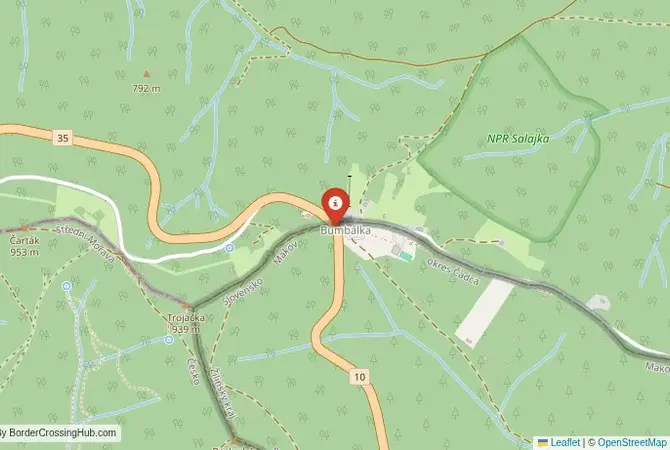
Approximate Border Location
Wait Times
15–60 min normal
Just crossed? Tap to report:
Operating Hours
6:00 AM–10:00 PM
Crossing Types
Pedestrians, cars
Border Type
Land crossing via road
Peak Times
7–10 AM mornings
Daily Crossings
1,000–2,000 daily
Currency Exchange
Limited nearby EUR, CZK
Safety Information
Quiet mountain crossing
Languages Spoken
Slovak/Czech
Accessibility Features
Ramps, assistance
About Bílá‑Bumbálka & Makov
Monthly Update (February 2026):
The forest road at the Bílá-Bumbálka & Makov Border Crossing stays calm, with cars passing in small clusters. Recent weeks have been mostly stable. Passenger traffic flows freely in both directions. Snowfall and holiday travel are what slow things down.
A Mountain Pass Crossing
The border crossing connecting the Slovak village of Makov with the area known as Bumbálka (part of the village of Bílá) in the Czech Republic is a journey over a high mountain pass in the Beskid and Javorníky mountains. This is a major road crossing, but one that has a distinct mountain character, with winding roads and spectacular scenery. Since both Slovakia and the Czech Republic are members of the European Union and the Schengen Area, there are no permanent border controls. To cross here is to travel through a landscape of dense forests, ski resorts, and traditional mountain chalets, a seamless passage between the Kysuce region of Slovakia and the Moravian-Silesian region of the Czech Republic.
Operational Details
This checkpoint connects Slovakia’s Žilina Region with the Moravian-Silesian Region of the Czech Republic. It is a major regional road (E442), open 24/7. The former border posts at the top of the Bumbálka pass are now largely abandoned or repurposed as restaurants or information centers. Traffic flows freely, and the only signs of the border are the standard blue EU signs. The route is popular with tourists, especially in winter, as it connects several ski areas. It is also an important route for regional trade and transit.
A History of the Velvet Divorce
The history of this crossing is the history of Czechoslovakia. For 75 years, this was an internal administrative line. The mountain ridge was a boundary between the Slovak and Czech parts of a single country. This changed on January 1, 1993, with the “Velvet Divorce.” The Makov-Bumbálka crossing was instantly transformed into a full-fledged international border. For over a decade, it was a place of passports, customs checks, and queues, a formal barrier in a region with deep historical and cultural ties. This all changed again in 2007 when both countries joined the Schengen Area, and the physical border controls were dismantled overnight.
The Seamless Border Procedure
Today, there is no border procedure for travelers. You simply drive through the mountain pass. There are no passport checks and no customs inspections. This is the reality of the Schengen Area. However, it is important to remember that both Czech and Slovak police and customs authorities can and do perform random checks on vehicles anywhere in their territory, including near the former border. You are still required to carry a valid passport or national ID card with you at all times.
The Surrounding Region: Slovakia Side
On the Slovak side, the crossing is in the Kysuce region. The village of Makov is a popular center for winter and summer tourism, located in a beautiful valley between the Javorníky and Beskid mountains. The area is known for its excellent conditions for cross-country skiing, hiking, and cycling. The nearby city of Žilina is a major economic and cultural center, with a beautifully restored historic square.
The Surrounding Region: Czech Side
On the Czech side, the crossing is in the Moravian-Silesian Beskids, a mountain range known for its traditional Wallachian culture. The village of Bílá is one of the most important ski resorts in the region. The area is known for its unique dialect and folklore, its wooden architecture, and its beautiful natural scenery. The nearby town of Rožnov pod Radhoštěm is home to the Wallachian Open Air Museum, a magnificent collection of traditional folk buildings. The sacred mountain of Radhošť, with its chapel and statue of the pagan god Radegast, is a popular pilgrimage and hiking destination.
Practical Travel Information
Practical planning for this route is very simple. The most important thing is to have the required motorway vignettes if your journey involves motorways in either country. Both Slovakia and the Czech Republic use an electronic vignette system (`elektronická diaľničná známka`), which must be purchased online in advance. The official currencies are the Euro (EUR) in Slovakia and the Czech Koruna (CZK) in the Czech Republic. Services are available in the towns on both sides of the border. The mountain roads are well-maintained but can be very challenging in winter, with heavy snow. It is essential to have appropriate winter tires and to check the weather and road conditions before you travel.
Final Considerations
The Makov–Bílá-Bumbálka border crossing is a scenic and popular route through the heart of the Beskid mountains. The abandoned checkpoint buildings are a reminder of a divided past, while the free-flowing traffic is a celebration of the present. It offers a beautiful journey through a region rich in nature and folklore. It is a border that you might not even notice you have crossed, a testament to the success of the Schengen project in this stunning mountain landscape.
No reviews yet.
